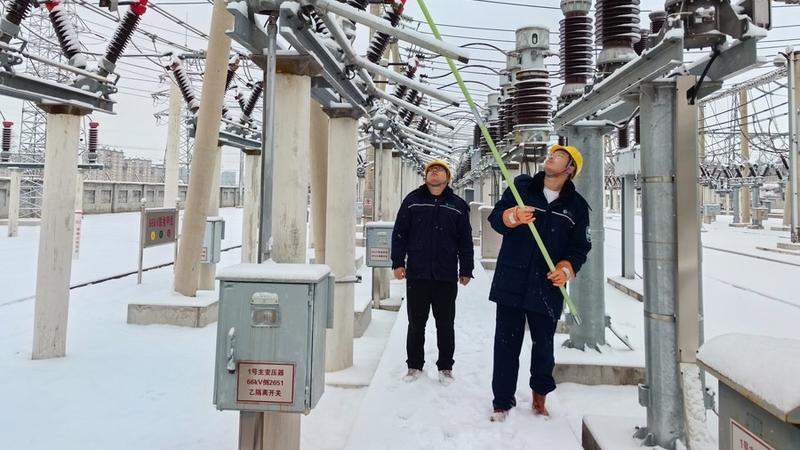 Staff members of a power supply company under the State Grid Corporation of China remove snow and ice from power supply equipment in Yanbian Korean autonomous prefecture, northeast China's Jilin province, Dec 15, 2023. (PHOTO / XINHUA)
Staff members of a power supply company under the State Grid Corporation of China remove snow and ice from power supply equipment in Yanbian Korean autonomous prefecture, northeast China's Jilin province, Dec 15, 2023. (PHOTO / XINHUA)
The trend of global warming will continue for a long term and human society will face a future that is hotter, drier and more humid, National Climate Center's experts said at a news conference on Friday.
It is crucial to enhance the ability to respond to extreme disasters, they said.
In January last year, Heilongjiang's Mohe set a record with a temperature of -53 C, breaking the previous record set in February 1969
In 2023, China experienced its highest average temperature since 1961, reaching 10.7 C, surpassing the typical annual temperature by 0.8 C, the National Climate Center said. This broke the previous record set in 2021 at 10.5 C.
READ MORE: Use of weather derivatives surges as extreme climate events increase
Despite the global warming backdrop, extreme weather events, including cold waves and snowstorms occurred with noticeable intensity.
In January last year, Heilongjiang's Mohe set a record with a temperature of -53 C, breaking the previous record set in February 1969, the center said.
Zhou Bing, chief expert at the center, said at the news conference that people should prepare for compounded disasters in China during the harsh winter.
Global warming has also intensified the water cycle, he said.
"Extreme precipitation events have become more frequent and intense. Heat waves and associated floods occur more frequently," he said.
The World Meteorological Organization warned early in 2016 about facing a future with hotter, wetter and drier conditions.
Human activities are the primary cause of the recent increase in greenhouse gas concentrations in the atmosphere, driving global climate change
"Given China's diverse topography and climate, the country stands as one of the most sensitive nations to global climate change," he said.
High-temperature heat waves, freezing cold, droughts, heavy rainfall and flooding, typhoons, dust storms, strong winds and haze occur frequently, with high intensity and wide-reaching impacts, he added.
"Extreme weather may deviate from traditional patterns, making climate risks more challenging to predict," Zhou said.
Jia Xiaolong, deputy director of the National Climate Center, said that human activities are the primary cause of the recent increase in greenhouse gas concentrations in the atmosphere, driving global climate change.
READ MORE: Global warming: China's weather broke multiple records in 2023
"There is a pressing need to prioritize climate security, slow down global warming and enhance meteorological disaster prevention and mitigation capabilities," he said.
Jia said individuals need to recognize their role both as contributors to greenhouse gas emissions and as victims of increased extreme weather events under climate change.
"Residents in northern regions that experience less rain than south, for example, need to learn more about information on heavy rainfall disasters, interpret meteorological disaster warnings issued by the government and be aware of the locations of nearby evacuation shelters," he said.


